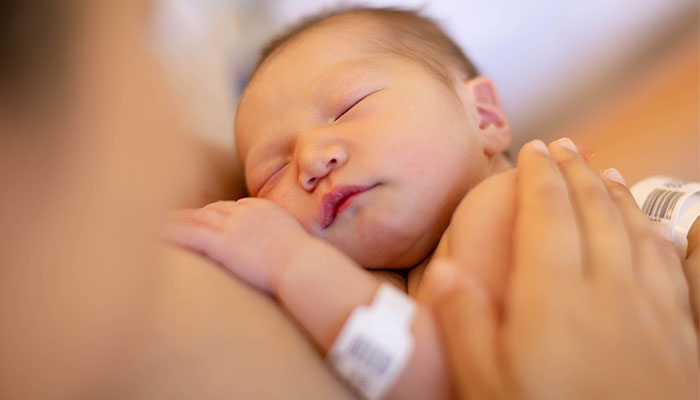HOW CAN WE HELP YOU? Call 1-800-TRY-CHOP
In This Section
Scientific Advisory Calls to Prioritize Developmental Care for Infants With CHD

Nurse Scientist Dr. Amy Jo Lisanti and colleagues published a call to action to prioritize resources for research into developmental care and outcomes for children with complex congenital heart disease.
As many as 30% of children who survive a heart defect at birth, known as congenital heart disease, will live with long-term developmental, cognitive, and physical disabilities or delays, according to the U.S. Centers for Disease Control. Developmental disabilities affect a wide range of abilities, from learning and thought-processing skills to social and behavioral functioning to physical coordination, and more.
Children at highest risk for developmental disabilities are those born with complex congenital heart disease (cCHD) requiring hospitalization and surgery during the first year of life — a time when a baby's brain and nervous system are in a period of rapid development.
Amy Jo Lisanti, PhD, RN, CCNS, FAHA, nurse scientist at Children's Hospital of Philadelphia Research Institute and assistant professor at the University of Pennsylvania School of Nursing, led an American Heart Association science advisory detailing the urgent need for clinical research aimed at improving neurodevelopmental outcomes for infants with cCHD.
In a science advisory published in the Journal of the American Heart Association, Dr. Lisanti and a group of interprofessional colleagues appealed to government agencies, policymakers, advocacy groups, healthcare leaders, researchers, and clinicians to prioritize research, funding, and infrastructure surrounding developmental care use and resources. Their work details the extensive and lifelong complications affecting many children with cCHD who live with developmental disabilities and their families.
This science advisory also provides a strategic roadmap for the scientific, healthcare, and policy-making communities through its comprehensive review of developmental care research findings to date, identification of current gaps in evidence-based knowledge, and recommendations for cCHD research priority areas aimed at filling those gaps.
Developmental Care for Infants With cCHD
Dr. Lisanti has dedicated her career to improving the care of children with cCHD and their families. Her program of research centers around the study of family-centered developmental care, a healthcare approach designed to promote optimal infant neurodevelopment within the context of the pediatric cardiac intensive care unit.
"Developmental care has been shown through research to maximize neurodevelopment and reduce long-term developmental disabilities in hospitalized infants who were born prematurely," Dr. Lisanti said. "But we don't yet know if this approach can provide similar protection for hospitalized full-term infants with cCHD. We must invest in research on family-centered, developmentally supportive interventions for babies with cCHD and their families so that we can learn how to provide care that optimizes outcomes for this vulnerable population."
Developmental care is a multipronged approach to foster neurodevelopment and provide protection from stress, pain, and parental separation by appropriately responding to each infant's behavioral cues and strengthening parents' role in reducing their infant's pain and stress through soothing actions, such as skin-to-skin contact, massage, and positioning.
It also includes modifications to the hospital environment to better meet the developmental needs of these infants. Several techniques shown to be beneficial for preterm babies include hospital room lighting that simulates normal day and night cycles, reduced noise and alarm sounds to decrease infant stress, and efforts to provide uninterrupted sleep by bundling care interventions, such as exams and vital sign measurements.
When the concept and strategies for developmental care began to emerge for preterm infants in the intensive care environment approximately 40 years ago, the primary research goal of full-term infants with cCHD was to improve survival. At that time, the risk and incidence of developmental disability were unknown. It wasn't until vast surgical and technological advances leading to significant improvements in infant survival rates that greater numbers of infants began to survive into childhood, adolescence, and adulthood.
Today, beyond research evaluating the effectiveness of developmental care interventions in full term infants with cCHD, additional research and resources are needed to modify some of the interventions due to the different physical, psychosocial, and emotional needs of these babies and their families. Similarly, resources and funding are required to equip specialized cardiac intensive care units with neurodevelopmentally protective accommodations, such as adjustments to lighting and sound.
A Champion for Family-centered Developmental Care
Dr. Lisanti is a long-time champion for family-centered developmental care. She and her team from CHOP and Penn were the first to publish work calling for this shift in the care of pediatric patients with heart disease.
"The changes in brain development we see in infants with cCHD are not unlike those that occur in preterm infants," Dr. Lisanti said. "It is vital to these infants and families that we in the pediatric cardiac community work together to develop and test family-centered developmental care interventions as a means to try to combat the many painful and invasive stressors experienced during hospitalization and enhance the protective effects family bonding provides."
Currently, Dr. Lisanti is conducting research studying the association between perceived family-centered care in the cardiac intensive care unit and parent mental health. She is also working to design developmentally supportive interventions for use in the cardiac intensive care setting that can be tailored to the unique needs of infants with cCHD and their parents.
Work on the scientific advisory was supported by the American Heart Association Pediatric Cardiovascular Nursing Committee of the Council on Cardiovascular and Stroke Nursing, Council on Lifelong Congenital Heart Disease and Heart Health in the Young, and Council on Hypertension.
